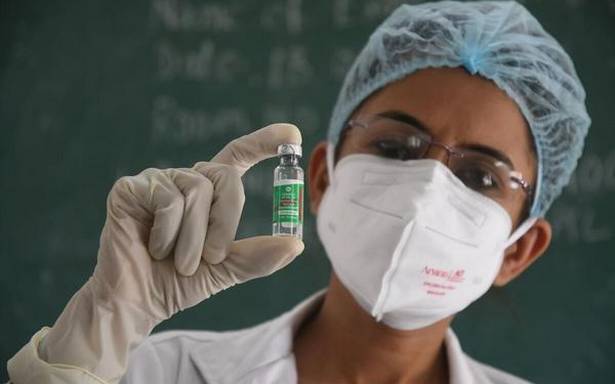In Supreme Court, govt. had said bringing vaccines under statutory regime will be “counter-productive”
Public health advocates and intellectual property rights experts point to a “contradiction” in India’s global push for suspension of intellectual property protection with its stand in the Supreme Court that bringing COVID-19 vaccines under a statutory regime will be “counter-productive” at this stage.
India, along with South Africa, had initiated a proposal for the temporary waiver of certain provisions in the Agreement on Trade-Related Aspects of Intellectual Property Rights (TRIPS) to facilitate fair, affordable and universal access of COVID vaccines and medicines, especially for developing countries.
The October 2020 communication to the TRIPS Council of the World Trade Organisation (WTO) referred to “several reports about intellectual property rights hindering or potentially hindering timely provisioning of affordable medical products to patients”.
The two countries had highlighted that some WTO Members had carried out urgent legal amendments to their national patent laws to expedite the process of issuing compulsory/government use licences.
“Internationally, there is an urgent call for global solidarity, and the unhindered global sharing of technology and know-how in order that rapid responses for the handling of COVID-19 can be put in place on a real-time basis,” they stressed in October last year.
The United States has recently conveyed its support for an intellectual property waiver for COVID-19 vaccines.
Govt. stand
However, experts point to an affidavit filed by the Centre in the Supreme Court on May 9, 2021, which shows the government taking a different stand in favour of protection of intellectual property rights.
“Any exercise of statutory powers either under the Patents Act, 1970 read with TRIPS Agreement and Doha Declaration or in any other way can only prove to be counter-productive at this stage,” the Centre has said in the affidavit.
The government assures that it is “very actively engaging itself with global organisations at a diplomatic level to find out a solution in the best possible interest of India”.
In fact, the Centre even goes to the extent of issuing a word of caution that “any discussion or a mention of exercise of statutory powers either for essential drugs or vaccines having patent issues would have serious, severe and unintended adverse consequences in the countries efforts being made on global platform using all its resources, good-will and good-offices through diplomatic and other channels”.
An April 30 order of the Supreme Court had “flagged” the legal framework within which the Centre could “possibly consider compulsory licensing and government acquisition of patents”.
The top court also gave the Centre freedom to “choose any other course of action that it deems fit to tackle the issue of vaccine requirements in an equitable and expedient manner, which may involve negotiations with domestic and foreign producers of vaccines”. It had underlined that the Centre should act in a way that public interest was of “paramount importance”.
However, not all are impressed by the balancing act. They have called for urgent steps for compulsory licensing of COVID vaccines and drugs to ramp up production and availability.
“The very purpose of the TRIPS waiver proposal is to end the monopoly on production and supply of medical products, including vaccines, and facilitate the scale-up of production of diverse manufacturers. The reluctance of the government to license the Covaxin technology to all potential producers and scale up its production reinforces vaccine monopoly. This approach of the government not only contradicts its position as a co-sponsoring country of the TRIPS waiver proposal but also compromises the moral high ground and negotiating capital at WTO,” intellectual property expert K.M. Gopakumar said.
A plea by IIT Madras alumnus Pratheesh Prakash, represented by advocates Sriram P. and Mukund P. Unny, in the Supreme Court accused the Centre of “enabling privatisation and profiteering over vaccines by monopolists in a manner contrary to public interest”.
“Even assuming for the sake of argument that Covishield vaccine developed by AstraZeneca and manufactured in India by its licensee Serum Institute of India is patent protected in foreign country, nothing will prevent the Union Government from releasing the patent protection to the domestic vaccine brand, viz. Covaxin developed jointly by ICMR and Bharat Biotech Ltd,” Mr. Prakash argued.
He said Covaxin, which was developed with the investment of money and knowledge capital of the State, currently has a “sub-optimal rate of production due to it only being manufactured by Bharat Biotech Ltd”.
A recent affidavit filed by the West Bengal government referred to India’s call in WTO to suspend intellectual property rights and urged the Centre to take “immediate steps for compulsorily licensing the vaccines and expand vaccine production through 18 manufacturing companies in India” to boost their availability.
The Mamata Banerjee government said the pandemic certainly qualified as a “national emergency”. It pushed the Centre to invoke the Patents Act of 1970 and issue compulsory licences to “any patents in force”. West Bengal reminded the Centre that the TRIPS Agreement allowed member-countries to invoke compulsory licensing for emergency use.
Source: Read Full Article

